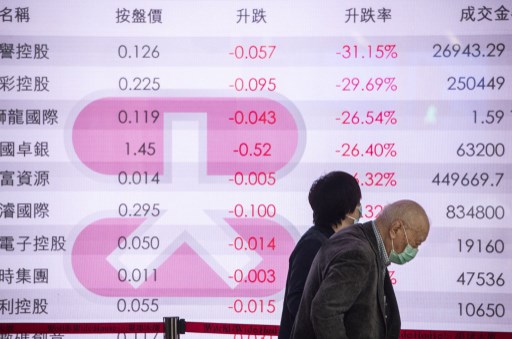Asia’s major equity markets slipped back on Tuesday with investors pondering the prospect of rising US borrowing costs as inflation spikes.
Fears over the possible collapse of troubled Chinese developer Evergrande have receded for now but traders are still watching developments closely for any signs of an imminent collapse.
And analysts said concerns that China’s energy crunch could hit growth in the world’s number two economy were adding to the downbeat mood, with Goldman Sachs lowering its outlook for this year.
Also on AF: Malaysia Pledges Big Spending, Green Goals in Five-Year Economic Plan
With the US economy back on track – and several Federal Reserve officials saying their goals of sustained inflation and tackling unemployment are close to being met – the US central bank is expected to begin tapering its ultra-loose monetary policy within months.
The policy committee signalled such a move at its meeting last week, while a closely watched guide to its interest rate plans suggested a rate hike could even come before the end of next year.
“Central bankers have set out how they want to ‘normalise’ monetary policy for some time. That process could start soon,” Chris Iggo of AXA Investment Managers said. “The realisation of this has the potential to provoke some volatility in rates and equities.”
On Wall Street the Dow edged up but the S&P and Nasdaq fell into the red, with tech firms more susceptible to higher interest rates.
And the selling filtered through to Asia, where Tokyo, Sydney, Seoul, Singapore, Wellington, Mumbai, Taipei and Manila followed suit.
The benchmark Nikkei 225 index slipped 0.19 percent or 56.10 points at 30,183.96, while the broader Topix index fell 0.29 percent or 5.97 points to 2,081.77.
CHINA CRACKDOWNS
However, Hong Kong rose more than 1%, having taken a battering in recent weeks from China’s crackdown on a range of industries – particularly tech firms and Macau-based casinos – and the Evergrande crisis. Shanghai also rose.
The Hang Seng Index climbed 1.20 percent, or 291.61 points, to 24,500.39. The Shanghai Composite Index rose 0.54 percent, or 19.39 points, to 3,602.22, while the Shenzhen Composite Index on China’s second exchange dipped 0.18 percent, or 4.36 points, to 2,402.20.
Initial fears that the collapse of the embattled real estate firm could spill into the global economy have eased. But there is still concern that if the issue is not handled properly the Chinese property sector, which accounts for a huge part of the economy, could take a massive hit.
The People’s Bank of China said on Monday it would ensure a “healthy property market” and protect buyers’ rights, as it looks to temper anger among investors about Evergrande failing to complete their properties, despite taking their money.
BIDEN’S DILEMMA
The central bank’s comments come after a tightening of rules around the real estate sector by Beijing strangled firms’ ability to invest and construct buildings, a major reason for Evergrande’s woes.
Adding to the sense of unease among investors is the drawn-out debt limit saga in Washington, where Republicans have blocked a Democrat move to raise the US borrowing limit, meaning the government will likely run out of cash at the end of the week.
But more worryingly, the country could default on its debt obligations next month, which most observers say would spark a massive financial crisis, with Republicans saying they refuse to pay for Democrats’ spending plans.
Several top officials including Treasury Secretary Janet Yellen and Fed chief Jerome Powell have urged politicians to step back from the brink and lift the limit.
The brewing crisis comes as Democrats fight to pass President Joe Biden’s multi-trillion-dollar infrastructure and social spending bills, with party infighting fuelling concerns that the president’s agenda could end up dead in the water.
Oil prices extended a recent rally on demand expectations and worries about supplies, with Brent breaking $80 for the first time in three years – briefly touching $80.75 – while WTI was also well up.
MARKETS
Tokyo > Nikkei 225: DOWN 0.2% at 30,183.96 (close)
Hong Kong > Hang Seng Index: UP 1.2% at 24,500.39 (close)
Shanghai > Composite: UP 0.5% at 3,602.22 (close)
New York > Dow: UP 0.2% at 34,869.37 (close)
- AFP with additional editing by Sean O’Meara
Read more:
China Energy Crunch Triggers Alarm, Plea for More Coal
Goldman Cuts China GDP Growth Forecast On Energy Supply Crunch
























